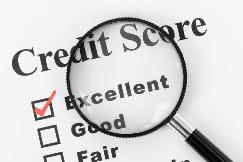Credit Score Ratings
Just recently FICO released data showing that over 25 percent of consumers now have a credit score of 599 or below. That’s a whopping 43 million people that are considered subprime and what’s even more startling is those numbers continue to climb.
Credit scores play such an integral role in our country’s credit system and more consumers need to be aware of how today’s financial decisions will impact tomorrow’s borrowing potential.
In FICO’s world ‘damage points’ are applied to a consumer’s credit score when there is evidence of financial hardship or patterns of risky behavior. Some ‘damage points’ can cause a minimal 10-20 point drop in your scores while others can downright cripple your chance of getting any credit because of a 200 point drop.
Now the real question that plagues consumers is what types of mistakes or patterns trigger ‘damage points’ and how can they go about avoiding the most common mistakes.
The closest thing to address this widespread confusion is by using FICO’s score simulator which basically allows you to see what type of drop or increase you will have on your credit score if you take certain actions.
While it does prove to be helpful it barely scratches the surface when you compare all the other scenarios that you may encounter.
To help you gain a better insight into FICO’s scoring model I have assembled some key tips and strategies that you may find useful.
Leverage your highest credit score
Find out what your credit scores are with Equifax, Transunion and Experian. Once you identify which score is the highest use it to your advantage when applying for credit.
For example, let’s suppose you have an Equifax score of 680 but only a 650 and 645 with the other two agencies. Apply for credit with a creditor that pulls from Equifax so you get the best available rates. It’s that simple!
Lower Overall Debt to Credit Utilization
You can lower your overall debt to credit utilization by paying down your balances and increasing your credit availability. By increasing your credit utilization you can raise your credit scores in a matter of weeks.
Avoid Excessive Inquiries
You can drop your credit score a few points with excessive credit report inquiries. Be sure to review what ‘hard inquiries’ are listed on your reports and take the necessary steps to remove unauthorized ones.
Dispute Inaccurate, Erroneous or Obsolete Information on Credit Reports
Review your credit files and if you uncover any information that is incorrect be sure to file a dispute with the consumer credit agency and repair your credit. A single derogatory item that is incorrect can cost you ‘damage points’ towards your credit score and may end up costing you thousands of dollars in unnecessary interest.
There are many other ways you can maximize your credit scores but one in particular that the majority of business owners need to pay close attention to is business debts reporting on their personal credit files.
This has a dramatic impact on your personal debt to credit utilization ratios along with a host of other factors that can hurt your chances of obtaining personal credit. It’s just smart business to separate your personal credit from business credit otherwise your scores will reflect an entirely different picture of you financially.
Ready to repair your credit? Become a member of my Business Credit Insiders Circle and gain access to a proven step-by-step business credit building system. A system that provides you access to personal credit recovery services, vendor lines of credit, fleet cards, business credit cards with and without a PG, funding sources and lenders that report to all the major business credit bureaus. Submit your name and email below for details and receive a free audio seminar ($597 value) =>
 Marco Carbajo is a business credit expert, author, speaker, and founder of the Business Credit Insiders Circle. A business credit solutions membership helping business owners build small business credit. He is a business credit blogger for AllBusiness.com, a subsidiary of Dun and Bradstreet and author of “Eight Steps to Ultimate Business Credit” and “How to Build Business Credit with No Personal Guarantee.” His articles and blogs have also been featured in American Express Small Business, Business Week, The Washington Post, The San Francisco Tribune, Scotsman Guide, Alltop, Entrepreneur Connect, and Active Rain.
Marco Carbajo is a business credit expert, author, speaker, and founder of the Business Credit Insiders Circle. A business credit solutions membership helping business owners build small business credit. He is a business credit blogger for AllBusiness.com, a subsidiary of Dun and Bradstreet and author of “Eight Steps to Ultimate Business Credit” and “How to Build Business Credit with No Personal Guarantee.” His articles and blogs have also been featured in American Express Small Business, Business Week, The Washington Post, The San Francisco Tribune, Scotsman Guide, Alltop, Entrepreneur Connect, and Active Rain.





 Marco Carbajo is a business credit expert, author, speaker, and founder of the Business Credit Insiders Circle. He is a business credit blogger for Dun and Bradstreet Credibility Corp, the SBA.gov Community, About.com and All Business.com. His articles and blog; Business Credit Blogger.com, have been featured in ‘Fox Small Business’,’American Express Small Business’, ‘Business Week’, ‘The Washington Post’, ‘The New York Times’, ‘The San Francisco Tribune’,‘Alltop’, and ‘Entrepreneur Connect’.
Marco Carbajo is a business credit expert, author, speaker, and founder of the Business Credit Insiders Circle. He is a business credit blogger for Dun and Bradstreet Credibility Corp, the SBA.gov Community, About.com and All Business.com. His articles and blog; Business Credit Blogger.com, have been featured in ‘Fox Small Business’,’American Express Small Business’, ‘Business Week’, ‘The Washington Post’, ‘The New York Times’, ‘The San Francisco Tribune’,‘Alltop’, and ‘Entrepreneur Connect’.